Dorling Kindersley Limited
The Penguin Group
Published by the Dorling Kindersley Limited,
80 Strand, London WC2R 0RL
LONDON, NEW YORK,
MUNICH, MELBOURNE, DELHI
Dorling Kindersley Limited, Registered Offices: 80 Strand,
London WC2R 0RL, England
www.dk.com
First Published in paperback in 2001 by Dorling Kindersley Limited. ISBN: 9780789480095
Copyright 2001 Dorling Kindersley
Text Copyright 2001 John Seymour and Martin Shervington
This Digital Edition published 2009. ISBN: 9780756662639
Digital conversion by DK Digital Content Services, London and DK Digital Media, Delhi.
No part of this publication may be reproduced, stored in a retrieval system,
or transmitted in any form or by any means, electronic, mechanical, photocopying, recording, or otherwise, without the prior written permission of the copyright owner.
Introduction
The ability to develop good relationships with others and to handle situations effectively are vital elements of being a successful manager. Introducing the skills of NLP (Neuro-Linguistic Programming), Maximizing Performance helps you to recognize the cues that give you insights into how you and others are feeling, and to develop the way you approach situations so that you can achieve the highest standards. By identifying areas of your performance that you need to improve, NLP focuses on changing your thoughts, assumptions, and emotions so that you can dramatically improve the results you get. Practical advice, including 101 concise tips, shows you how to develop NLP skills and put them into practice; and a self-assessment test at the end of the book allows you to evaluate your performance levels.
Thinking about Performance
NLP (Neuro-Linguistic Programming) helps managers to work well with others and to develop themselves. Use NLP to recognize the small changes that produce significantly better results.
Knowing the Key Skills
The critical factor for maximizing professional performance is improving how you manage yourself and your working relationships with others. Recognize that this is something you can learn and that NLP shows you how to develop the necessary skills.

Realize that only you can improve the results you are currently getting.
Improving effectiveness
Globalization and improved communication technologies have increased the pressure on all businesses to perform, and this in turn has put pressure on staff performance. Recent research has shown that it is not IQ or technical competence that determine your professional effectiveness. The biggest impact on professional success is how well you manage yourself and your working relationships with others this is known as emotional intelligence. Increase your effectiveness as a manager by identifying and developing the critical emotional intelligence skills you need.
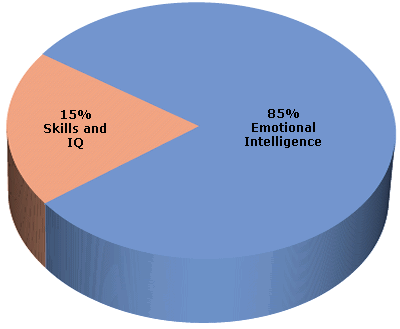
Identifying successTechnical skills and IQ account for about 15 percent of top-level performance, whereas 85 percent of professional success is due to emotional intelligence.
Points to remember
- Poor performers will often feel stress and react in a less than optimal way.
- When you have a problem, think about the skills you could learn to increase your competence.
- It is important to be curious about what your emotions are trying to tell you.
Understanding emotional intelligence
There are two aspects of emotional intelligence that determine your performance as a manager. The first is your ability to handle situations in an effective manner. Top performers use their emotions as a guide to improving what they do. The second is your ability to be sensitive to others and knowing how to make a difference to the performance of others.
What is NLP?
The field of NLP is a tool kit of skills used by managers to develop emotional intelligence skills and improve performance. NLP skills focus on the way you think about what you are doing that already works, what you are doing that does not work, and what you need to do differently. Change what you think, feel, and believe, and you will dramatically alter the results you get. With repeat practice, these skills become automatic and lead to a continuous improvement in performance.
Applications of NLP
By adopting NLP skills, you can quickly increase your effectiveness and significantly improve your performance. This has an impact on the results you and your organization achieve.
- Improves performance
- Communicates effectively with others
- Achieves career success
- Retains a positive emotional state
- Solves problems

Understand that emotional intelligence can transform your performance and career.
Using NLP
Many people think that emotional intelligence is a natural skill that you either do or do not have. It is, in fact, a set of skills that you can learn. Use NLP techniques to help you identify and focus on areas of your performance that you need to improve. Then, explore what to do differently so that you can begin to improve the results you achieve. This is the first step in developing your emotional intelligence.
Applying NLP skills
Much of your performance at work is probably already very effective. However, applying NLP skills will help you improve the small part of your work that limits your overall performance. Many of the skills in NLP will be natural to you already, such as goal-setting or mental rehearsal. Once you are aware of an area where you do not perform well, choose an NLP technique that will make a difference to your performance. If, for instance, you realize that you have difficulty meeting important deadlines, use the NLP skill of setting yourself daily objectives so that you are able to plan your time effectively.
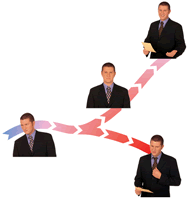
Using mental rehearsal to improve your performanceThis manager recognizes that he is nervous when giving presentations to his colleagues. Through using the NLP skill of mental rehearsal, he could improve his performance considerably.

Recognize that NLP focuses on what works.

Look at your work and identify any difficulties.
Questions to ask yourself
- What areas of my performance am I satisfied with?
- What aspects of my performance do I want to improve?
- Do I know what I need to do to improve my skills?










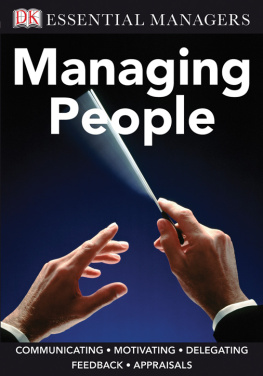
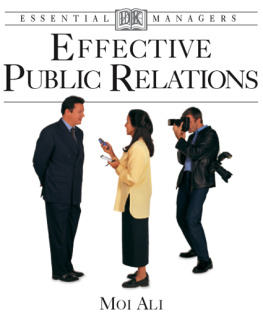

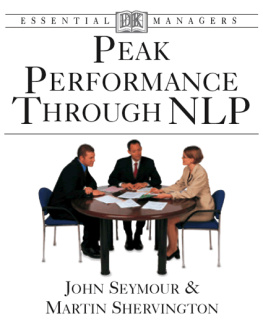
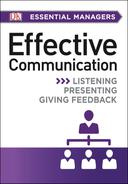





 Realize that only you can improve the results you are currently getting.
Realize that only you can improve the results you are currently getting.
